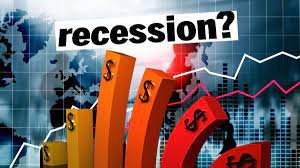A recession is a period of economic decline spread across the economy, lasting more than a few months. It is typically accompanied by a decline in real gross domestic product (GDP), employment, and income. Recessions can be caused by a variety of factors, including:
- Financial crises: A financial crisis can lead to a recession if it causes a sharp decline in lending and investment.
- Sudden declines in demand: A sudden decline in demand for goods and services can lead to a recession if it causes businesses to cut production and lay off workers.
- Supply shocks: A supply shock, such as a sudden increase in oil prices, can lead to a recession if it causes businesses to raise prices and consumers to cut spending.
- Government policies: Government policies, such as a sudden increase in taxes or a decrease in government spending, can also lead to a recession.
The United States has experienced 14 recessions since the Great Depression of the early 1930s. The most recent recession was the COVID-19 recession, which began in March 2020 and ended in April 2020.
Here is a list of all the recessions in the United States since the Great Depression:
- 1937-1938: This recession was caused by a sharp contraction in the money supply.
- 1949: This recession was caused by a combination of factors, including a decline in military spending and a tightening of monetary policy.
- 1953-1954: This recession was caused by a combination of factors, including a decline in investment and a tightening of monetary policy.
- 1957-1958: This recession was caused by a combination of factors, including a decline in consumer spending and a tightening of monetary policy.
- 1960-1961: This recession was caused by a combination of factors, including a decline in investment and a tightening of monetary policy.
- 1970: This recession was caused by a combination of factors, including a decline in consumer spending and a tightening of monetary policy.
- 1973-1975: This recession was caused by a combination of factors, including the oil crisis and a tightening of monetary policy.
- 1980: This recession was caused by a combination of factors, including a tightening of monetary policy and a decline in consumer spending.
- 1981-1982: This recession was caused by a combination of factors, including a tightening of monetary policy and a decline in consumer spending.
- 1990-1991: This recession was caused by the Gulf War and a tightening of monetary policy.
- 2001: This recession was caused by the dot-com bubble and a tightening of monetary policy.
- 2007-2009: This recession was caused by the subprime mortgage crisis and a collapse of the financial system.
- 2020: This recession was caused by the COVID-19 pandemic.
The length and severity of recessions can vary widely. The shortest recession on record was the 1953-1954 recession, which lasted only 8 months. The longest recession on record was the Great Depression, which lasted from 1929 to 1939.
Recessions can have a significant impact on the economy and on people’s lives. They can lead to job losses, declines in income, and a decrease in economic activity. Recessions can also lead to social unrest and political instability.
There are a number of things that can be done to mitigate the effects of a recession. These include:
- Government intervention: Governments can intervene in the economy to provide support to businesses and individuals. This can include providing tax breaks, loans, and other forms of assistance.
- Monetary policy: Central banks can use monetary policy to stimulate the economy. This can involve lowering interest rates or increasing the money supply.
- Fiscal policy: Governments can use fiscal policy to stimulate the economy. This can involve increasing government spending or cutting taxes.
Recessions are a natural part of the business cycle. However, they can be a difficult time for businesses and individuals. By understanding the causes and effects of recessions, we can better prepare for them and mitigate their impact.
 Speed Khabar
Speed Khabar



